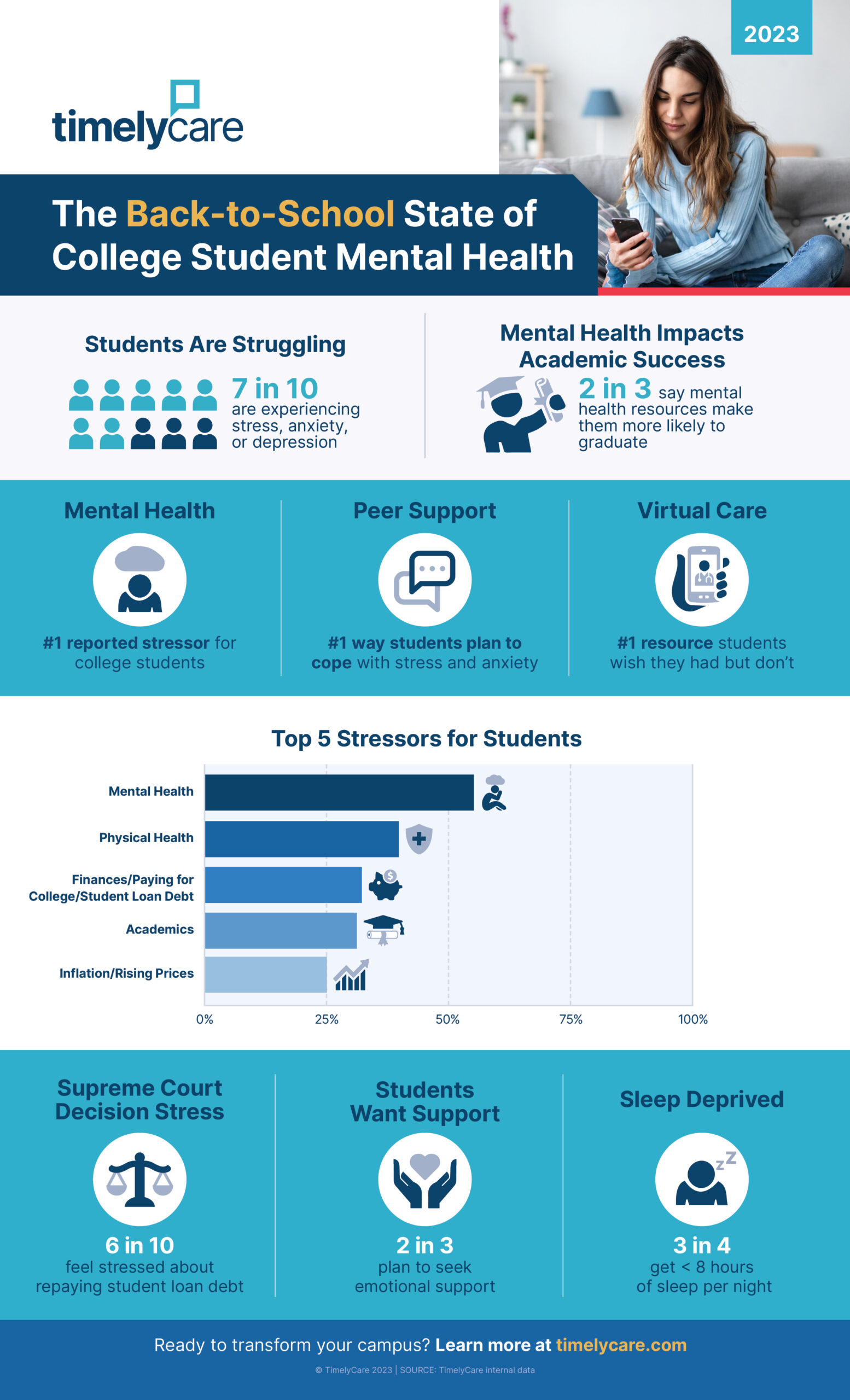Mental Health, Supreme Court Rulings Among College Students' Top Stressors

FOR IMMEDIATE RELEASE
August 1, 2023
Contact: Gina Katzmark, [email protected], 218-310-2259
(FORT WORTH, Texas) — College students are facing significant stress and sleep deprivation as they prepare for the fall semester, according to a recent survey by TimelyCare, higher education’s most trusted virtual health and well-being provider.
The survey, which gathered responses from 1,200 college students nationwide, highlights the ongoing mental health crisis on campuses and sheds light on the top stressors students are currently facing.
Mental health is the number one reason students drop out of college. According to the survey, it is clear students want support so they can stay enrolled, as 64% say they are more likely to graduate if they have access to mental health resources. An earlier survey found that nearly 60% of current college students accessed mental health care during their K-12 years.
The findings also reveal that 68% of students are struggling with mental health issues such as stress, anxiety, and depression. Financial concerns also weigh heavily on students, with two of their top five stressors revolving around money, and six in 10 (60%) reporting stress or anxiety about repaying their student loan debt since the Supreme Court ruling on loan forgiveness.
Other key findings include:
- An overwhelming majority (85%) of students say they are experiencing more or the same level of stress compared to this time last year.
- Students’ top five stressors include their own mental health (55%), their physical health (40%), their finances/paying for college or student loan debt (32%), their academics (31%) and inflation (25%).
- More than half (53%) of students report feeling stressed or anxious about the Supreme Court ruling on affirmative action and race in admissions.
- Additionally, more than half of the students (54%) are getting less than the recommended 7-9 hours of sleep per night, as suggested by the National Sleep Foundation.
“There will always be stressors out of students’ control and outside influences that will impact student mental health and well-being,” said Seli Fakorzi, Director of Mental Health Operations at TimelyCare. “The good news is that colleges and universities realize that the student mental health crisis is far from over, and they continue to invest in resources – like TimelyCare – that help bolster on-campus resources to build a connected system of care that supports student health and well-being and ultimately leads to stronger engagement and academic performance.”
While the mental health crisis among college students shows no signs of slowing down, one positive trend is the number of students who want to seek help.
- Students are actively seeking support. Two-thirds (66%) of students plan to seek out emotional support to manage their mental health this academic year.
- Students recognize the importance of community. The most common way students plan to cope with their stress or anxiety this semester is through their peers (54%), followed by their family (44%) and exercise (38%).
- Students are yearning for accessible mental health resources. Access to virtual counseling and mental health support through a teletherapy or virtual care app is the number one resource students wished their schools offered.
Pressure to Perform
Student-athletes, who face additional pressures such as intense practice, competition and travel schedules, also experience higher instances of mental health challenges.
The survey shows that mental health is a significant cause of stress and anxiety for more than half of student-athletes (52%), surpassing concerns about physical health, finances, and academics. Alarmingly, a lack of adequate sleep is prevalent among student-athletes, with 58% reporting getting six hours of sleep or fewer and 37% getting five or fewer. Research by the National Sleep Foundation has linked insufficient sleep to an increased risk of experiencing depressive symptoms.
Efforts by athletics departments and high-profile athletes to destigmatize mental health issues seem to be making a difference, as more than 90% of student-athletes express their intention to seek in-person or virtual counseling/mental health support in the coming year, compared to 75% of their classmates who are not athletes.
“Mental health crises are not scheduled – and we cannot expect college students to wait days or weeks for care during their darkest hours,” said Dr. Bob Booth, Chief Care Officer at TimelyCare. “Being able to connect with students whenever and wherever they are is crucial to help stop the cycle of sick care and start students on the fast track to personal and academic success so they can be well and thrive.”
The TimelyCare nationwide online survey conducted in July 2023 underscores the need for increased support and resources to address the ongoing crisis.


